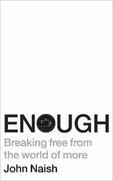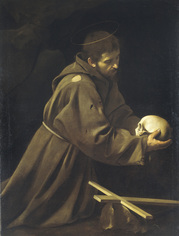
This exchange invites a question, 'how much is enough?' How much is enough of anything - faith, love, food, work, information? We live in a culture that is dominated by the excess of many things. Yet as human animals we are driven by a seemingly insatiable appetite for more. While this may be a part of our biology, our scriptures and traditions teach us another way that may help us off the treadmill of more, more, more. God in Christ invites us into another way of seeing the world and our needs within it...

Our church calendar this week sees the feast day of St. Francis of Assisi, a twelfth century monk and preacher whose life and teachings have inspired generations of Christians (see left, Caravaggio portrait of Francis in prayer). He is perhaps best known as the patron saint of animals, and that is why we are holding our blessing of animals service at St. Luke's today. But to see him in this light is to grasp only a tiny part of the gift that Francis brought to the church.
He began life as the son of a wealthy merchant, and was by all accounts a spirited and rebellious youngster, who enjoyed the finer things of life. However certain events triggered a profound conversion of life for him - he was wounded in war; he encountered a leper and was moved with compassion for him; he had a spiritual experience of God speaking to him directly and urging him to build the church, which became focussed for him in the reconstruction of the ruined church of San Damiano. He attempted to use his father's wealth to do this, but his father, believing he had gone mad, took him to court, and eventually disowned and disinherited him, such that Francis actually removed even the clothes he was wearing, refusing to own anything of his father's, and from that moment on embraced a life of poverty.
Choosing poverty in various ways has long provided an answer to the question of 'how much is enough?' Once an individual or group decides no longer to invest in protecting themselves from loss by seeking more possessions, more prestige, more security, they are liberated to engage more deeply with God. Voluntary poverty is a tool to release us from entanglement in the clutter of life, that keeps us distracted from what is essential. It frustrates our ego's constant clamour for material comfort and security. And Francis embraced it to the full.
Francis adopted the rough clothing of a beggar, and if he came across a beggar dressed more poorly than he was he would immediately swap clothes with them. He wrote, 'I think the great Almsgiver would account it a theft in me did I not give that I wear unto one needing it more.' Francis begged for everything - for stones for the church building, for oil for the candles and for his own food - and he insisted that the monks who followed him did the same. By doing this he deliberately put himself in the position of 'a worthless slave', as Jesus described the true disciple, and emphasised total dependence on God.
To Francis the shame of being a beggar was essential, in order to break the human notion of being in control. Indeed he would not even allow his monks to soak beans overnight to cook the next day, because this would take them out of their reliance on God for the next meal. He saw that it was but a small step from soaking beans, to starting to scan the larder shelves and getting caught in providing stock for the next week. Francis took the 'daily ' in 'give us this day our daily bread', absolutely literally.
We may feel that Francis is just too radical for us, and that we cannot possibly live up to his demands. Yet his example can spur us to review our lives and our priorities and reconsider what our 'enough' might be. If the point is to have enough space in our lives for prayer and praise; for taking long walks that lift the heart and delight our animal companions; for loving our fellow human beings both near and far, then why are we spending so many hours working to buy cars or houses or digital gadgets? Are our choices at work and in the shopping mall really coming from a place of faith - by which I mean a place of trust, that the God who loves us will indeed provide abundantly all that we actually need- which may of course be very different from what we think we want. Anyone who has walked up the confectionery aisle with a four year old knows how early in life we convince our selves that these two things are the same - 'I want a chocolate bar' is swiftly translated into 'I really need one'.
John Naish in his excellent book 'Enough', has a checklist of questions to ask before buying something. They are these:
'Do I need it?
Has the desire for this thing been implanted by marketing techniques?
Do I want this because I desire to be fitter, cleverer, more leisured, or just cooler ? If so will the item actually work this miracle?
Is there another way that I could achieve my goal without accruing more stuff?
How many more hours will I have to work out pay for it? What else could I do with the working time that would bring more fulfilment than the consumer item?
Is there anything I already own that I could substitute for it?
Do I really want to dust, dry clean, pay to have it serviced or otherwise maintain it?
If I'm replacing something that I have already got, what's really wrong with the old one?
If I really do need this thing, is there any way that I could obtain it on a free-site, or borrow it from a friend, relative or neighbour?'
The last of course comes close to Francis's idea that we should beg - things that are free do not increase our status, and we don't like asking to borrow things, because there is an element of shame attached to not being independent. Yet our Christian faith teaches us to be dependent on God and unafraid to trust and depend on others. If as human beings we learnt to trust one another and share our resources, we would indeed be able to move the mountains of poverty around our world that have been erected by greed and false self- sufficiency.
Faith cannot be counted. It cannot be externally increased. Rather God's gracious gift of an interior attitude of openness and trust can trigger the poverty of spirit that Jesus tells us is blessed. Those so gifted, like Francis, can encourage us to reject the profit and reward culture that surrounds us, and embrace little by little a simpler, more trusting way. So let us pray for the gift of faith, to embrace a poverty that allows us know when we have enough, and let us find in that interplay of prayer and poverty a new voice of praise for the God who meets the needs of all creatures. Amen.
 RSS Feed
RSS Feed